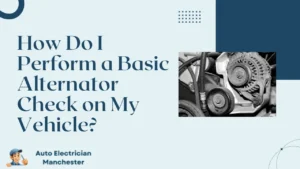
Your car’s alternator is the silent guardian of your electrical system, tirelessly converting mechanical energy into electricity to keep your battery charged and power all your vehicle’s electronic components. A healthy alternator ensures a smooth ride, but a failing one can cause a frustrating breakdown, leaving you stranded on the side of the road.
However, fret not! By understanding the common symptoms of a failing alternator, you can be proactive and avoid such an unpleasant situation.
A Guide to a Healthy Electrical System
A failing alternator disrupts the delicate balance of your car’s electrical system. Let’s delve into the most common warning signs that indicate it’s time to visit your mechanic:
Dim or Flickering Lights
One of the most telltale signs of a failing alternator is a noticeable change in your car’s lights. The alternator supplies consistent voltage to your headlights, taillights, and interior lights. If it’s on the fritz, these lights may become dim or start flickering erratically. This inconsistency arises from the alternator’s struggle to maintain adequate power output.
Electrical System Gremlins
A failing alternator can wreak havoc on your car’s electrical system, causing a variety of strange behaviors. Inconsistent power can lead to sluggish power windows, a malfunctioning radio, or flickering and dying dashboard gauges. These seemingly unrelated electrical issues all stem from the alternator’s inability to provide a steady stream of electricity.
Battery Blues
The alternator plays a crucial role in keeping your car’s battery charged. When it’s failing, it can no longer properly replenish the battery’s energy reserves. This can lead to difficulty starting your car, especially after short trips that don’t allow the alternator enough time to recharge the battery adequately. You might also see the battery warning light illuminated on your dashboard, serving as a visual reminder of the underlying problem.
Whining Noises from Under the Hood
While a healthy alternator operates silently, a failing one might announce its demise with a whining noise emanating from the engine compartment. This sound is often most noticeable when you first start your car. It’s caused by the failing bearings within the alternator struggling to function properly.
Burning Rubber or Electrical Scent
In severe cases, a failing alternator can emit a burning rubber or electrical wire smell. This pungent odor indicates a serious problem, potentially caused by internal electrical components overheating or burning out. If you detect this smell, pull over immediately and turn off your car to prevent further damage.
Can You Drive With a Failing Alternator?
While it’s not recommended to drive with a failing alternator for extended periods, you might be able to limp your car to a mechanic shop in a pinch. If you notice the warning signs and act quickly, you can potentially minimize the risk. Here’s what to consider:
Severity of Failure: The extent of alternator damage determines how far you can drive. A partially failing alternator might allow you to drive a short distance, while a completely dead one will quickly drain the battery, leaving you stranded.
Battery Condition: A healthy battery can provide some backup power if the alternator weakens. However, a weak battery combined with a failing alternator creates a perfect storm for a quick breakdown.
Electrical Load: The more electrical components you use (headlights, air conditioning, stereo), the faster you’ll drain the battery. If possible, minimize electrical use while driving with a failing alternator.
Conclusion
Driving with a failing alternator is a gamble. It’s best to err on the side of caution and get your car checked by a mechanic as soon as possible. Ignoring the issue can lead to a complete electrical failure, potentially causing more extensive and expensive repairs.
FAQ
What causes an alternator to fail?
Several factors can contribute to alternator failure, including worn-out brushes, faulty voltage regulator, overheating, and bearing wear.

David Mack is a seasoned writer with a passion for the auto electrician niche. With years of hands-on experience and a knack for demystifying complex topics, David brings practical insights to his readers. Whether you’re a professional or a car enthusiast, his engaging articles offer valuable tips and trends in auto electrical systems.
